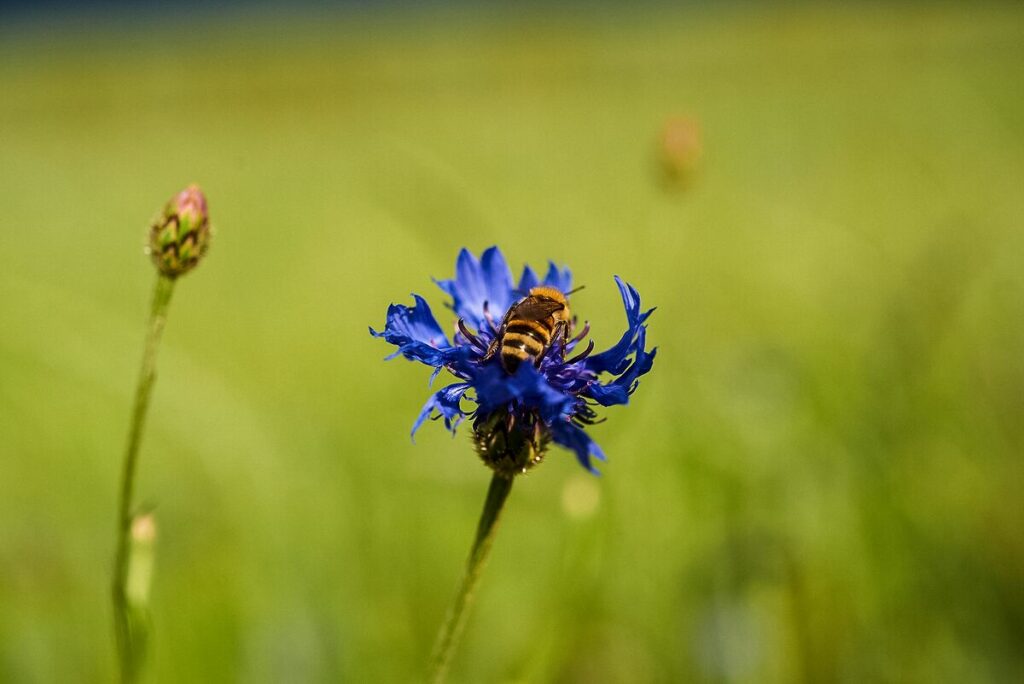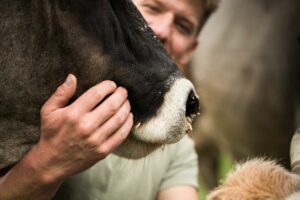Save the bees with organic and biodynamic farming
Insects are an integral part of our ecosystem: honeybees, along with other insects, are intimately connected to food production. They play a crucial role in the fertilization of many wild and cultivated plants. 75% of food crops rely on animal pollination, and when it comes to wild flowering plants this percentage rises to 90% (Apidologie 2021). This means that honeybees are essential both to nature and food security, and ultimately essential for the survival of human beings.
However, their population is declining year by year and although they are essential to farming, our current mainstream farming practices are partly responsible for this decline. Intensive farming practices, monocropping and the use of pesticides are threatening pollinators worldwide. Organic and biodynamic farming shows that it doesn’t have to be that way, farming can actually help protect the bees and ensure their continued existence. Beekeeping is even recommended on every biodynamic farm precisely for this reason. It is not about keeping bees for honey production, but for the importance they have in the whole web of life.
Agribusiness is killing pollinators
There are many reasons for the decline in bee populations: climate change, habitat loss, pest and diseases, and last but not least the use of pesticides. One common denominator behind these different causes is the agribusiness industry. The last Insect Atlas published by the Heinrich Böll Foundation and Friends of the Earth Europe, shows that industrial farming and especially the intensive use of pesticides play a major role in the decline of insects worldwide.
According to the Insect Atlas, pesticides are one of the main causes of insect mortality because they affect the entire ecosystem, regardless of their classification as herbicide, fungicide, or insecticide. Since 1950, the quantity of pesticides applied on crops has increased five-fold with industrial farms applying over 4 million tonnes of chemical pesticides per year worldwide. Only a handful of companies share the two-thirds of this global market: BASF, Bayer, Syngenta, Corteva and DowDuPont.
Despite the lethal and sublethal effects of pesticides on pollinators, the current trend is not aiming for pesticide reduction. Asia is the part of the world where one can find the highest applications of pesticides, with Chinese farmers applying three times more than the global average, followed by the Americas, with North America, Brazil, and Argentina. This is mainly due to the dominance of the agribusiness industry making agriculture dependent on the use of pesticides.
Organic and biodynamic farming can save the bees
Based on this evidence, the key to saving the bees is clear: a drastic reduction of pesticide use is needed. This goes hand in hand with more sustainable farming methods such as organic and biodynamic farming that do not rely on the agribusiness industry’s farming model and inputs. The Assessment report on pollinators, pollination and food production published by the Intergovernmental Science-Policy Platform on Biodiversity and Ecosystem Services (IPBES) stresses that organic farming reduces or mitigates the negative agricultural impacts on pollinators and lists organic farming among the main actions to reduce the use of pesticides.
According to the FiBL Research Institute the promotion of biodiversity within organic farming enables pollinators to benefit from organic farming practices. Indeed, biodiversity is three times higher and the number of bees seven times higher than on conventional farms. Honeybees, wild bees, and bumblebees benefit from the higher coverage and diversity of secondary flora in organic grain fields. The increased number of bees on organic farm even has a positive impact on the surrounding farmland and natural areas.
Organic and biodynamic farming both show that the use of chemical pesticides is not a necessity in agriculture. The impact of farming on bees can be a positive one, but it needs a fundamental change in practice. If we want to hear the bees buzzing again in our fields and in our natural surroundings, the answer is straightforward: policies worldwide must encourage organic and biodynamic farming practices and support farmers towards a just transition.
Beekeeping as part of biodynamic farming
Biodynamic farming goes a step further by recommending beekeeping on every biodynamic farm, not necessarily to produce honey but to support bees and the wider environment. This builds on the long cultural history of relationship between humans and bees. Due to their activities as pollinators which has such a stimulating effect on the life of plants and of nature, bees are of great importance to the whole web of life. The beneficial effects of having bees in the cultivated landscape can be experienced in the increased yield and quality of many farmed crops.
Demeter beekeepers work to support the health and resilience of hives, siting them carefully to avoid environmental pollutants, and allowing them to have a invigorating effect in both the cultivated and wild landscape, while they produce honey and other hive products. To ensure this the International Demeter Beekeeping Standard – soon to be integrated in the International Demeter Biodynamic Standard – details the way beekeepers must operate. The objective is to guarantee that bees can unfold according to their nature in a favourable environment supporting in this way the maintenance of the bee population.
Awareness on World Bee Day
Bees are a central part of our existence and environment. To ensure their survival our efforts must turn towards organic and biodynamic farming that protect and support bee populations. Let’s keep the bees humming and buzzing by supporting farming practices that can make the difference – not only today at the annual World Bee Day!
Read more about the role of biodiversity at Demeter! Find out more about biodynamic beekeeping.
Contact: Clara Behr, Head of Policy and Public Relations
clara.behr@demeter.net
Brussels, 20.05.2022



